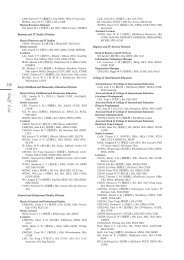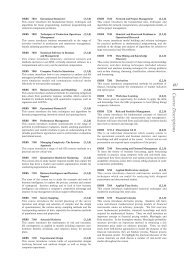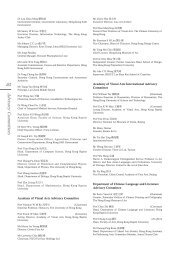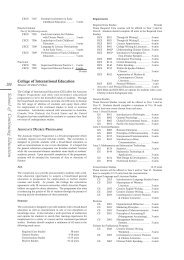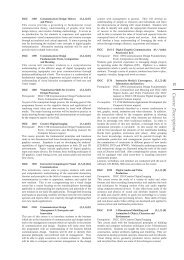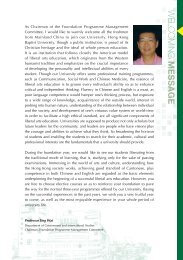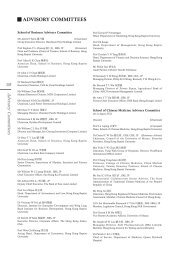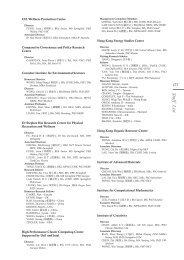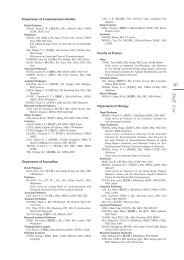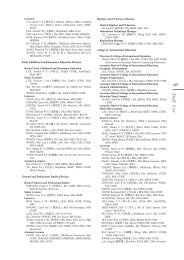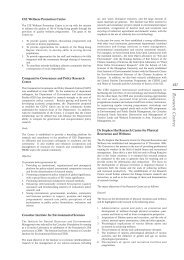334<strong>Course</strong> <strong>Descriptions</strong>German-speaking countries through a combination of intensivelanguage training, academic study and, whenever feasible,supervised working experience on location in Europe. Semester Iis usually spent at a university. Semester II is spent at a universityand/or a work placement (internship/traineeship) in a privatecompany or public institution.Students will be placed individually or in very small groups atselected partner institutions of the European Studies <strong>Course</strong>/theDepartment of GIS. The course of study will normally compriseintensive foreign language tuition (French or German) andselected academic courses, as they are available at the respectivepartner institutions. In case of internships, students will be placedindividually with the assistance of the programme co-ordinators.Internships may vary in length but shall not extend six monthsof duration. Internship placements are subject to availability ofplaces, suitability of the student and approval by host companies.EURO 3110 Contemporary European Societies (3,2,1) (F)II: questions d’actualitéPrerequisite: Internship year in French-speaking Europe orequivalent; ability to use French for <strong>Academic</strong>Purposes in speech, reading and writingThis is the second part of a course which spans the internshipyear in Europe and builds on the themes examined in the firstpart (see EURO 2110) in the light of students’ living and learningexperience in Europe. A review of the latest and current eventsto be observed in the French-speaking countries of Europe in thesocial, political and economic fields forms the basis of this course.The students are expected to link their experience in Europe withthis most updated knowledge in order to be fully prepared for theirfuture career in a French-speaking context. The course outlinevaries from year to year, according to the latest events and newsof Belgium, Switzerland, Luxembourg and France. The courseends with a special focus on the position and contribution ofthese countries in the European Union. This course is open toEuropean Studies majors only.EURO 3120 Contemporary European Societies (3,3,0) (G)II: Struktur und Zukunft der SozialenMarktwirtschaftPrerequisite: EURO 2120 Contemporary European SocietiesI: The German-Speaking Countries or courseinstructor’s approvalBased on earlier traditions, the Federal Republic of Germanypurposely developed a specific political and economic system—the“Social Market Economy (SME)”. It created an extensive welfarestate, but also institutions, which emphasized non-confrontational,co-operative action of employers and employees within a freemarket. Austria and Switzerland pursued similar strategies. Theresulting “model Germany” underpinned the “economic miracle”of the Bonn republic after 1949 and decisively shaped its culture.In recent years, however, SMEs have faced serious challenges.Social services expansion outpaced economic growth. Thesystem became too costly and was further affected by enormousdemographic changes and (in the nineties) the cost ofreunification. Increasing automation in the industry, changingmanagement structures and the globalization of trade and capitalmarkets all contributed to structural unemployment. At thebeginning of the new millennium, Germany (as well as otherEuropean nations) needs to reform the SME. In the process, newindustrial, labour, fiscal and educational policies are pursued totransform the country into a post-industrial service economy,while trying to retain, as much as possible, the characteristics ofthe successful consensus model of the SME. This course is opento European Studies majors only.EURO 3140 Current Issues of European (3,2,1) (E)IntegrationPrerequisite: For GIS major: POLS 1120 Introduction to PoliticalEconomy or POLS 1510 Foundations of PoliticalScienceFor ES major: EURO 2140 The Political Economyof the European UnionThis course aims at offering students a clear overview of theeconomic, political, social and diplomatic issues raised by recentinstitutional developments of the European Union. On the onehand, it consolidates knowledge of institutional structures andkey policy-making processes and results in recent years. On theother hand, it raises critical awareness of the deeper theoreticaland practical questions these developments pose. One of themain components of the course is the growing importance ofglobalization and the opening of Europe to other regions of theworld, in particular China and East Asia. The course integratestheoretical perspectives and case studies. This course is open toYear III major in GIS and Year IV major in European Studiesonly.EURO 3160 European Economic and Business (3,3,0) (F)Life: travailler en contexte internationalPrerequisite: EURO 3110 Contemporary European Societies II:questions d’actualité and FREN 3111 EuropeanLanguage III (French)The course is mainly based on a project that the students haveto carry through to a successful conclusion through the teacher’ssupervision and advice. It is presented in a seminar format.The project has to involve representatives from the Frenchspeakingworld as well as from <strong>Hong</strong> <strong>Kong</strong>/China. It meansthat the professional environment, which is to be imaginedin consultation between the teacher and the students, sets uprelations/contacts between institutions/companies/publicauthorities from a French-speaking country and their counterpartsand/or partners in <strong>Hong</strong> <strong>Kong</strong>/China.The various relations and contacts to be established in oral andwritten French will be presented under different forms: letters,interviews/discussions, faxes, telephone calls, e-mails, minutes,etc.In order to increase the authenticity of the project, all data andresources necessary to the students to carry the project through toa conclusion (i.e. information about various existing companies/institutions, public authorities in French-speaking Europe and<strong>Hong</strong> <strong>Kong</strong>/China) are to be found on the Web.The objectives of this course are (1) to train the students to be ableto achieve efficiently common oral and written tasks in variousprofessional situations in a French-language environment; (2) toenhance the students’ understanding of multicultural professionalcontexts, where are involved (French-speaking) European and<strong>Hong</strong> <strong>Kong</strong>/Chinese counterparts; and (3) to help the studentsgrasp the logic of professional contacts/relationship and increasetheir sense of initiative and self-reliance in this field. This courseis open to European Studies majors only.EURO 3170 European Economic and Business (3,3,0) (G)Life: Wirtschaft in Wandel/DeutschchinesischeWirtschaftsbeziehungenPrerequisite: EURO 3120 Contemporary European Societies II:Struktur und Zukunft der Sozialen Marktwirtschaftand GERM 3111 European Language III (German)Since the late 1990s, Germany, Austria and Switzerland haveadapted to global economic forces by a restructuring of industries,both on a macro- and a microeconomic level. New managementand production methods have changed the workplace and pose,above all, challenges to the education and training systems. Thecourse will first discuss recent changes in the industry and theirimplications for the labour market. It will then investigate theireffects on human resources development and present case studiesof the new job market.A key element of the new “knowledge economy” is the utilizationof information technologies. The course will attempt to showhow these are applied in industry and trade and how they affectcommercial relation between <strong>Hong</strong> <strong>Kong</strong> and Europe (includinglanguage use). Emphasis will be given to business sectors mostlikely to employ students after graduation (e.g. marketing,merchandizing, human resources and information services).Guest speakers from the German, Austrian and Swiss Chambersof Commerce are invited to provide up-to-date briefings, wheneverfeasible. The course may involve project work. This course isopen to European Studies majors only.
EURO 3205 Comparative Politics of (3,2,1) (E)Post-Communist Central EuropePrerequisite: For GIS/ES major: POLS 1005 Foundations ofPolitical Science or EURO 1008-9 Europe: Unityand DiversityThis is a course which examines new European Union MembersStates in Central Europe (in particular, Poland, Hungary,the Czech Republic and Slovakia) from both historical andcomparative perspectives. It begins with a discussion of the natureand weaknesses of the Communist regimes of Eastern Europeand the causes and processes leading to the 1989 upheavals in theregion. It then considers the paradoxes and obstacles in the courseof post-Communist transitions to democracy, the market economyand the civil society. The key issues of democratic consolidationand pro-market transformation will be addressed.EURO 3511 European <strong>Academic</strong>/Internship (0,0,0)Semester IPrerequisite: FREN 2112 European Language II (French) orGERM 2112 European Language II (German)The European <strong>Academic</strong>/Internship Semester provides fulllinguistic and cultural immersion into the societies of French- orGerman-speaking countries through a combination of intensivelanguage training, academic study and, whenever feasible,supervised working experience on location in Europe. SemesterI is usually spent at a university in either the French- or Germanspeakingarea of Europe.Students will be placed individually or in very small groups atselected partner institutions of the European Studies Programme/the Department of GIS. The course of study will normallycomprise intensive foreign language tuition and selected academiccourses, as they are available at the respective partner institutions.EURO 3512 European <strong>Academic</strong>/Internship (0,0,0)Semester IIPrerequisite: EURO 3511 European <strong>Academic</strong>/InternshipSemester IThe European <strong>Academic</strong>/Internship Semester provides fulllinguistic and cultural immersion into the societies of French- orGerman-speaking countries through a combination of intensivelanguage training, academic study and, whenever feasible,supervised working experience on location in Europe. SemesterII is spent at a university and/or a work placement (internship)in a private company or public institution in either the French- orGerman-speaking area of Europe.Students will continue to study at selected partner institutions ofthe European Studies Programme/the Department of GIS. Thecourse of study will normally comprise selected academic courses,as they are available at the respective partner institutions. Incase of internship, students will be placed individually with theassistance of the Year III supervisors. Internships may vary inlength but not exceed six months of duration.EURO 3591-2 Honours Project (European Studies) (3,*,*)The Honours Project is carefully selected and designed incollaboration between teachers, students, and possibly, externalagencies. These projects, though rigorous in their essence, areless intended as pure exercises in academic research than asreports presented on topics directed towards real-life problemsand situations encountered in Europe. Although usually writtenin English, the Honours Project will show bibliographicaland citational familiarity with French or German languagepublications and sources. This course is open to European Studiesmajors only.EURO 4005 Current Issues of European (3,2,1)IntegrationPrerequisite: For GIS major: POLS 2006 Introduction to PoliticalEconomy or POLS 1005 Foundations of PoliticalScienceFor ES major: EURO 2007 The Political Economyof the European UnionThis course aims at offering students a clear overview of theeconomic, political, social and diplomatic issues raised by recentinstitutional developments of the European Union. On the onehand, it consolidates knowledge of institutional structures and keypolicy-making processes in the recent years. On the other, it raisescritical awareness of the deeper theoretical and practical questionsthese developments pose. One of the main components of thecourse is the growing importance of globalization and the openingof Europe to other regions of the world, in particular China andEast-Asia. The course integrates theoretical perspectives and casestudies.EURO 4006 European Economic and Business (3,3,0)Life: travailler en contexte internationalPrerequisite: FREN 4008 European Language in Context III(French) and EURO 4015 Contemporary EuropeanSocieties II: questions d’actualité or equivalentThis is mainly a project-based course in which students willuse Web resources to set up a simulated professional situationinvolving representatives from the French-speaking Europeancountries and their international partners (from <strong>Hong</strong> <strong>Kong</strong> and/or the People’s Republic of China).Students are expected to develop their knowledge about thebusiness world and its environment and to acquire a “knowhow”tool set in an occupational context. The course will alsoenhance the students’ communication and interpersonal skillsin an international professional setting, with a special focus onthe French-language work environment. These multi-facetedcompetencies will build a savoir d’action (“how to act”) transferablefor successful transitions to work, and ultimately, careers withinglobal companies/organizations.EURO 4007 European Economic and Business (3,3,0)Life: Wirtschaft im Wandel/DeutschchinesischeWirtschaftsbeziehungenPrerequisite: GERM 4008 European Language in ContextIII (German) and EURO 4016 ContemporaryEuropean Societies II: Struktur und Zukunft derSozialen Marktwirtschaft or equivalentThis course discusses recent developmental trends in theeconomies of German-speaking Europe and, in particular,economic relations between China/<strong>Hong</strong> <strong>Kong</strong> and the Germanspeakingcountries. It will look at specific business processesand current issues affecting enterprises in Europe and China/<strong>Hong</strong> <strong>Kong</strong>. Its objective is to familiarize students with actualbusiness challenges arising from general political and economicchanges, thereby providing insights into potential career fields forgraduates.The course may include guest speakers from the business sectorand visits to enterprises and business-related institutions in <strong>Hong</strong><strong>Kong</strong> and the Pearl River Delta.The course is held entirely in German.EURO 4015 Contemporary European (3,2,1)Societies II: questions d’actualitéPrerequisite: EURO 2005 Contemporary European SocietiesI: The French-Speaking Countries and Internshipyear in French-speaking Europe or equivalent orAbility to use French for <strong>Academic</strong> Purposes inspeech, writing and readingThis is the second part of a course which spans the year in Europeand builds on the themes examined in the first part (EURO2110) in the light of students’ living and learning experience ina European French-speaking country. The course outline variesfrom year to year, since it consists of a review of the current eventsand trends to be observed in Belgium, France, Luxembourg andSwitzerland in the social, political and economic field. Supportmaterials mainly comprise the latest press articles and variousofficial and non-governmental institutions’ data available online inFrench.EURO 4016 Contemporary European Societies (3,3,0)II: Struktur und Zukunft der SozialenMarktwirtschaftPrerequisite: EURO 2006 Contemporary European Societies I:The German-Speaking Countries and Internship335<strong>Course</strong> <strong>Descriptions</strong>
- Page 3 and 4: economic growth, trade, pollution,
- Page 5 and 6: specific empirical economic problem
- Page 7 and 8: of private enterprises in the indus
- Page 9 and 10: period. The first part of the cours
- Page 11 and 12: The reactions and effectiveness of
- Page 14: 314Course DescriptionsEDUC 3080 Tea
- Page 17 and 18: development of children and adolesc
- Page 19 and 20: and communication skills in differe
- Page 21 and 22: y ubiquitous technology. Learners w
- Page 23 and 24: ENG 2650 Topics in English Grammar
- Page 25 and 26: clause structures of the English la
- Page 27 and 28: adopted for reading and interpretin
- Page 29 and 30: drama; and (2) introduce Western dr
- Page 31 and 32: ENGL 4005 Advanced Topic in Compara
- Page 33: attendant to the break-up of mediev
- Page 37 and 38: states, enlargement provides signif
- Page 39 and 40: to create and develop ideas via rel
- Page 41 and 42: strategies of awarded campaigns to
- Page 43 and 44: characteristics of films, film-make
- Page 46: 346Course DescriptionsFINE 1005 Fin
- Page 49 and 50: GCHC 1005 China and the Global Econ
- Page 51 and 52: the period with a special focus on
- Page 53 and 54: est decision-making procedures. Mor
- Page 55 and 56: GCPE 1065 Table Tennis (1,2,0) (C)T
- Page 57 and 58: and/or philosophical traditions the
- Page 59 and 60: on the use of English in various se
- Page 61 and 62: GDAR 1835 Music, Mind, and Human (3
- Page 63 and 64: lead to successful development of n
- Page 65 and 66: management and proactive stakeholde
- Page 67 and 68: GDCV 1065 Buildings of Hong Kong: (
- Page 69 and 70: of various religions that broaden t
- Page 71 and 72: their implications for contemporary
- Page 73 and 74: gone through since 1945 included th
- Page 75 and 76: GEOG 1005 Geography and the Contemp
- Page 77 and 78: students to the concepts and techni
- Page 79 and 80: GEOG 3730 Energy Policy and Analysi
- Page 81 and 82: processes interact with China’s s
- Page 83 and 84: GERM 1006 German II (3,3,0) (G)Prer



